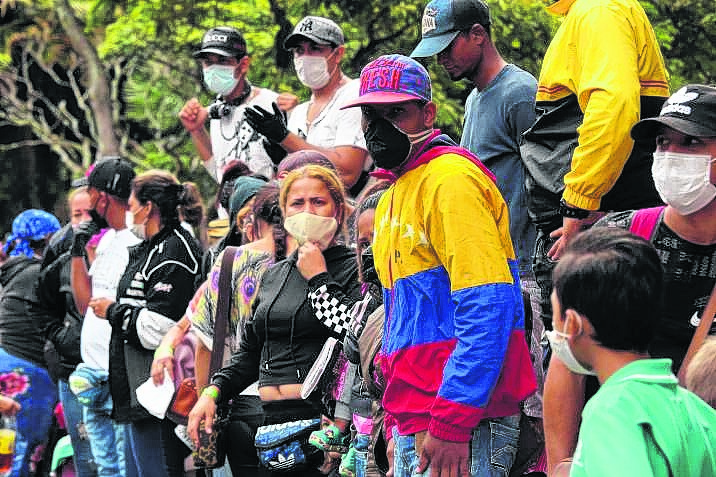Patrick FORT *
In some countries they are blamed for insecurity, crime, unemployment, public deficits, problems in hospitals, and even for divorces.

The truth about the venecos? For me they take them out like rats ”. That tweet is just one of the messages highlighted by the xenophobia barometer, a tool created by university students and NGOs in Colombia to measure “hatred” against Venezuelan migrants. The content is terrifying.
“Comemierdas”, “sons of bitches”, “plague” were other insults identified by this meter. Rejection of Venezuelans who have emigrated en masse in recent years grows throughout Latin America in a bleak economic context and the coronavirus pandemic.

–
The departures began after the election of Nicolás Maduro, the heir of Hugo Chávez after his death in 2013, and intensified between 2014 and 2015, with an economic crisis that ruined purchasing power and led more than five million Venezuelans to leave the country in search of better conditions.
The flow has slowed down, but it has not stopped as it went through the eighth year of economic recession in the former oil power. “In principle, there was an upper-middle-class immigration, who traveled by plane with valid documents, some savings,” explains Claudia Vargas, a sociologist at the Universidad Simón Bolívar in Caracas. “This has not happened since the end of 2014” when poorer classes began to emigrate.
About 60% of the more than 5.4 million Venezuelan migrants are undocumented. And the majority, some 1.7 million, live in Colombia, ahead of Peru, Chile and Ecuador, according to the Frontera Viva site.
“The worst is Peru”
The “venecos” are now blamed for insecurity, crime, unemployment, public deficits, problems in hospitals, and even the increase in divorces.
And the xenophobic discourse has been imposed in Chile, Ecuador, Brazil and Peru, in addition to Colombia, where the barometer has made an analysis of the insults.
Juan Emilio L., a 31-year-old undocumented Venezuelan, ended up settling in Chile after passing through Colombia, Ecuador and Peru. “It is a more closed town and it is difficult to get papers, but the truth is that they let you work and they do not mess with you or disown you as it happened to me in other countries,” he tells AFP. “The worst, Peru, not there they even want to see us in painting ”.
Videos of Peruvians insulting Venezuelans frequently circulate on social media.
“Why are you such an idiot to transport the ‘shit’? You are an idiot, an idiot ”, says for example a client to a Venezuelan delivery man in Lima, according to one of them. “I’m sick of you (…) Do you want me to send you a combo (punch) to your fucking country, son of a bitch?”
Peru, which had 60,000 Venezuelans before the crisis, is now home to about 1.2 million.
Both President Pedro Pablo Kuczynski (2016-2018), an active rival of Maduro, and his successor Martín Vizcarra maintained an open border policy for Venezuelans. But the authorities have toughened their measures since 2019, when the issue broke onto the political scene.
The fight against immigration has been at the center of the 2021 presidential campaign. Pedro Castillo, a left-wing nationalist leading the polls ahead of the June 6 runoff, has promised to deport all illegal immigrants within 72 hours of their eventual coming to power: “what [Maduro] come and take your compatriots who have come here to commit crimes ”.
Chile, for its part, has deported hundreds of Venezuelans in an irregular situation. “You return a person to a country (…) that you have recognized in your political discourse that they are in danger in their country,” criticizes Vargas.
Refugees?
Some countries have started operations to integrate their immigrants. Colombia, which has also deported Venezuelans who committed crimes, initiated a regularization plan for almost a million Venezuelan migrants, in the middle of a political dispute between Maduro and President Iván Duque.
The Dominican Republic also hopes to regularize 115,000 undocumented Venezuelans, whom it considers to be a “qualified” workforce, according to Enrique García, director of Migration for this country, who denounces and condemns the significant Haitian immigration. But the trend continues to be towards closure, explains Vargas, who gives as an example the militarization of the border in Ecuador or the “legal walls”, such as apostilled documents or high administrative fees, which he says many countries have imposed to make regularization difficult.
“The only thing that this generates is that there is more irregularity and therefore more people in vulnerable conditions,” he adds.
“There is a recognition of the crisis”, which “deserves an added responsibility”, says the expert. But for her, although the ideal would be to grant refugee status to these immigrants, this represents “too great a legal, political and financial responsibility that countries do not have.”
* AFP Journalist
–

